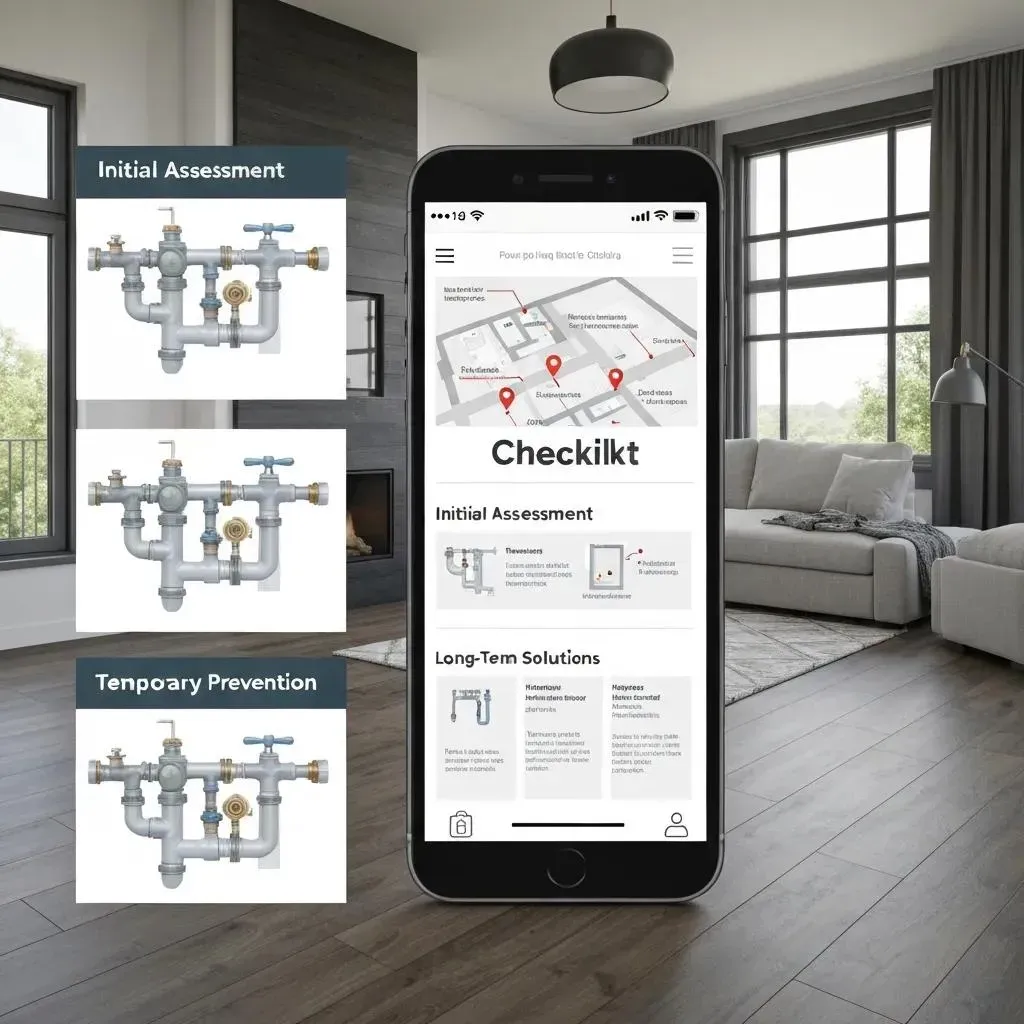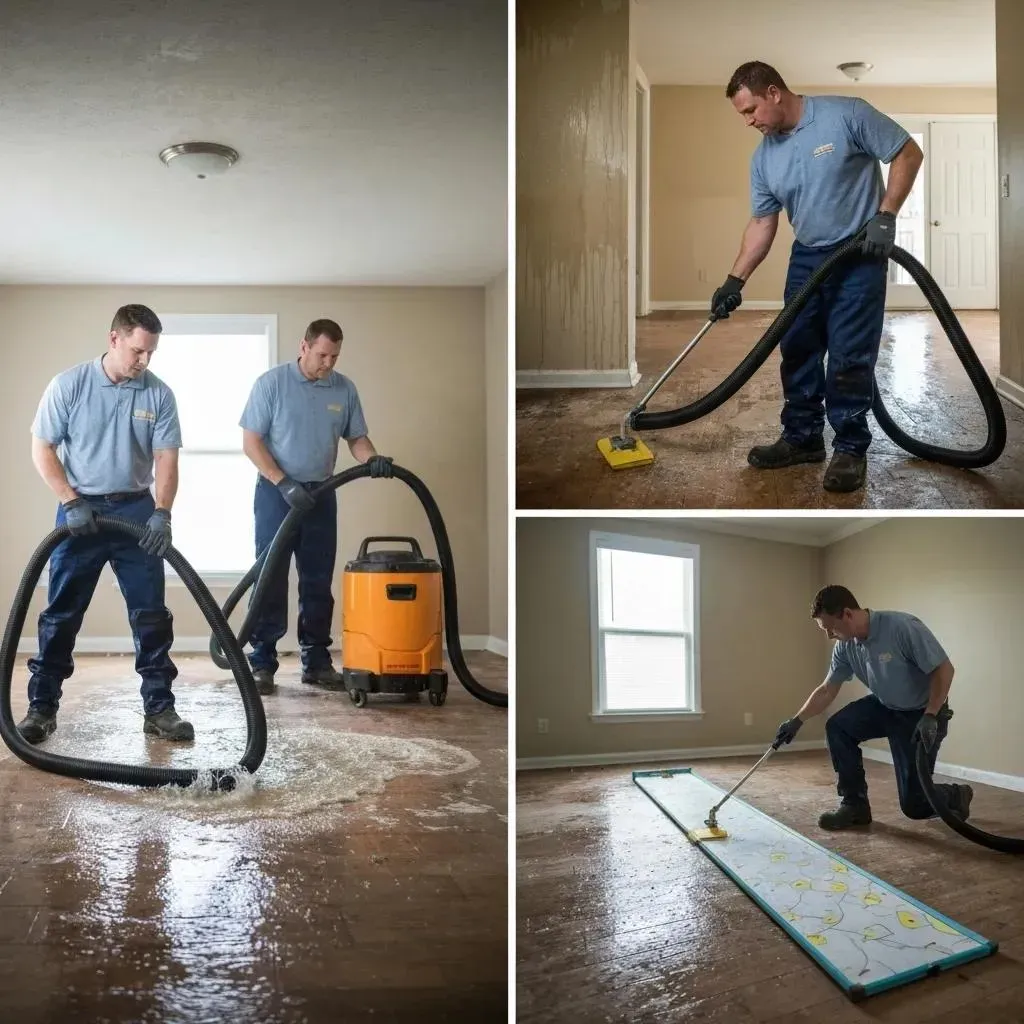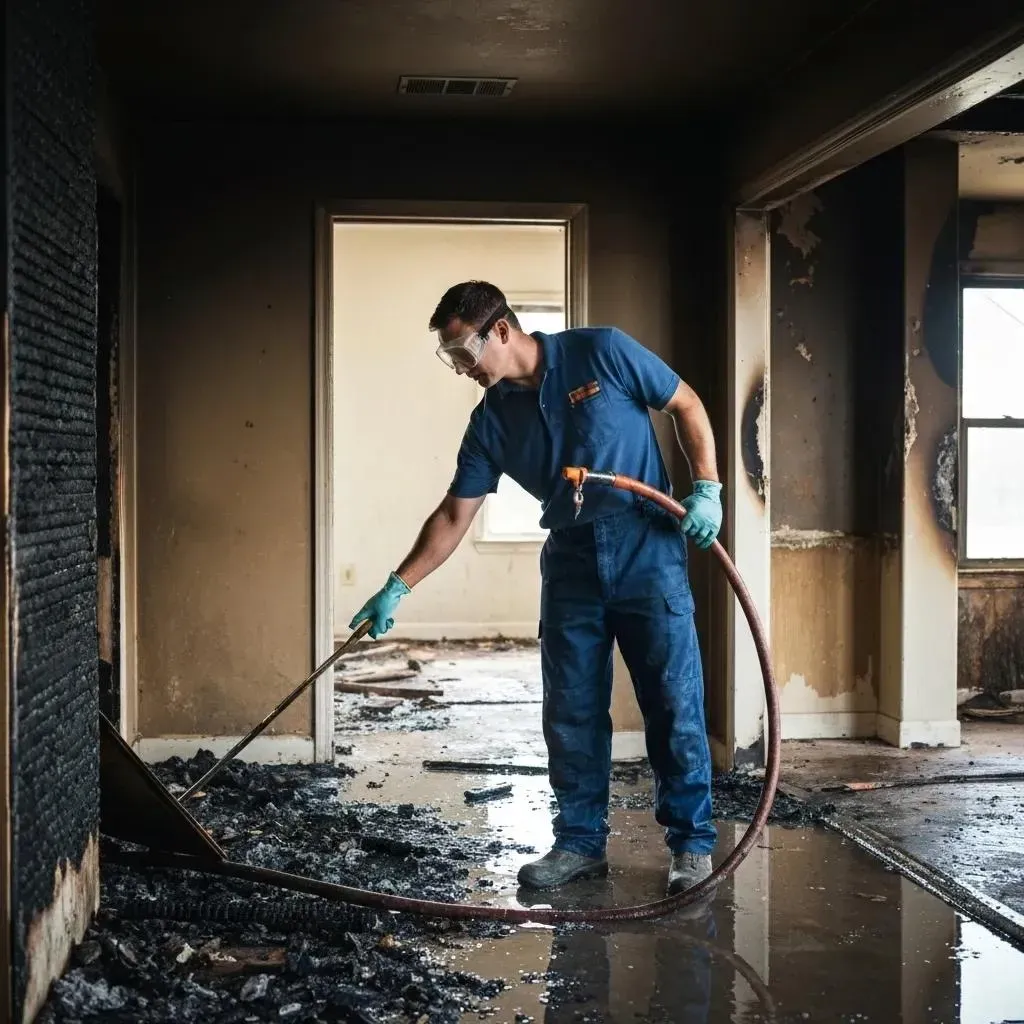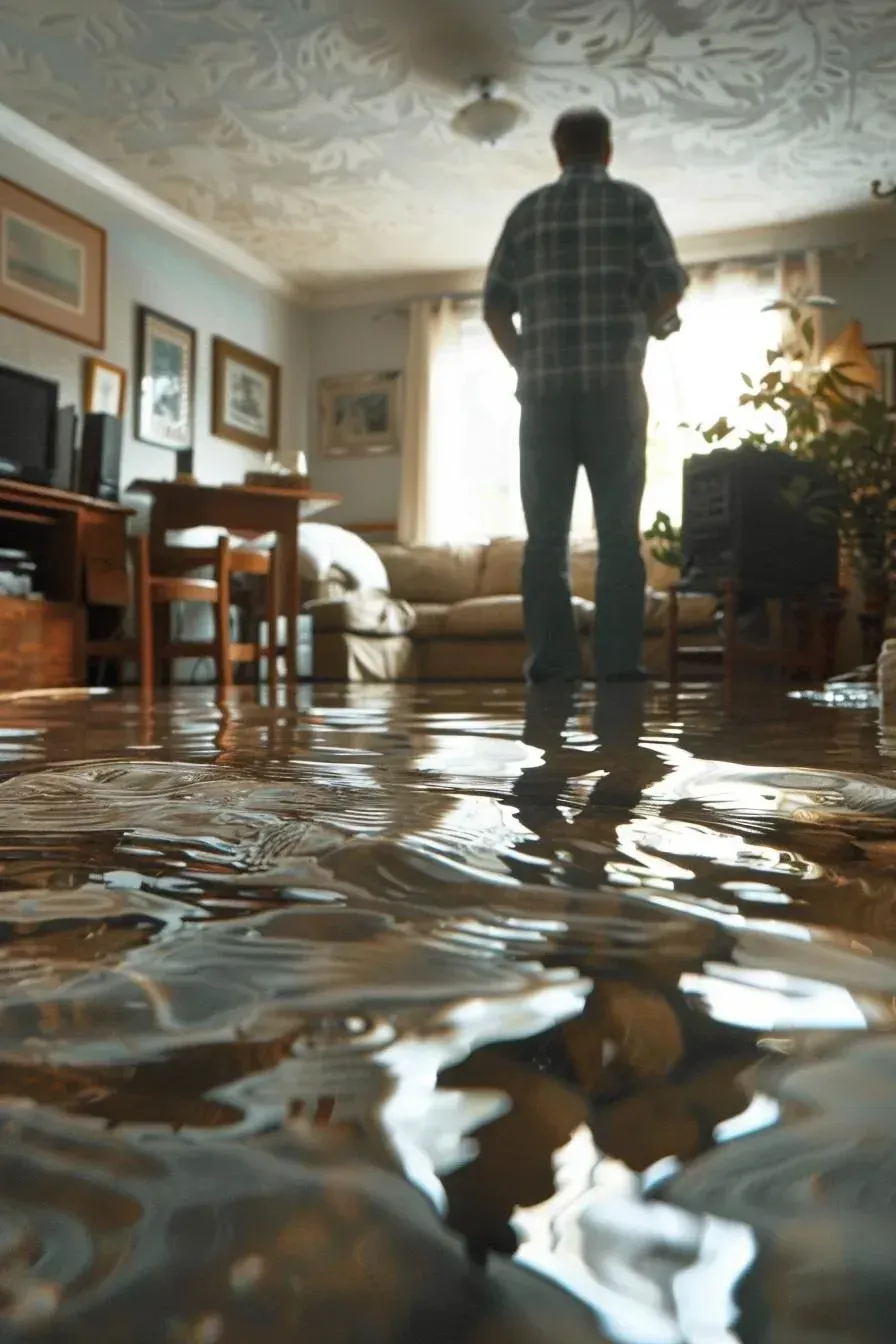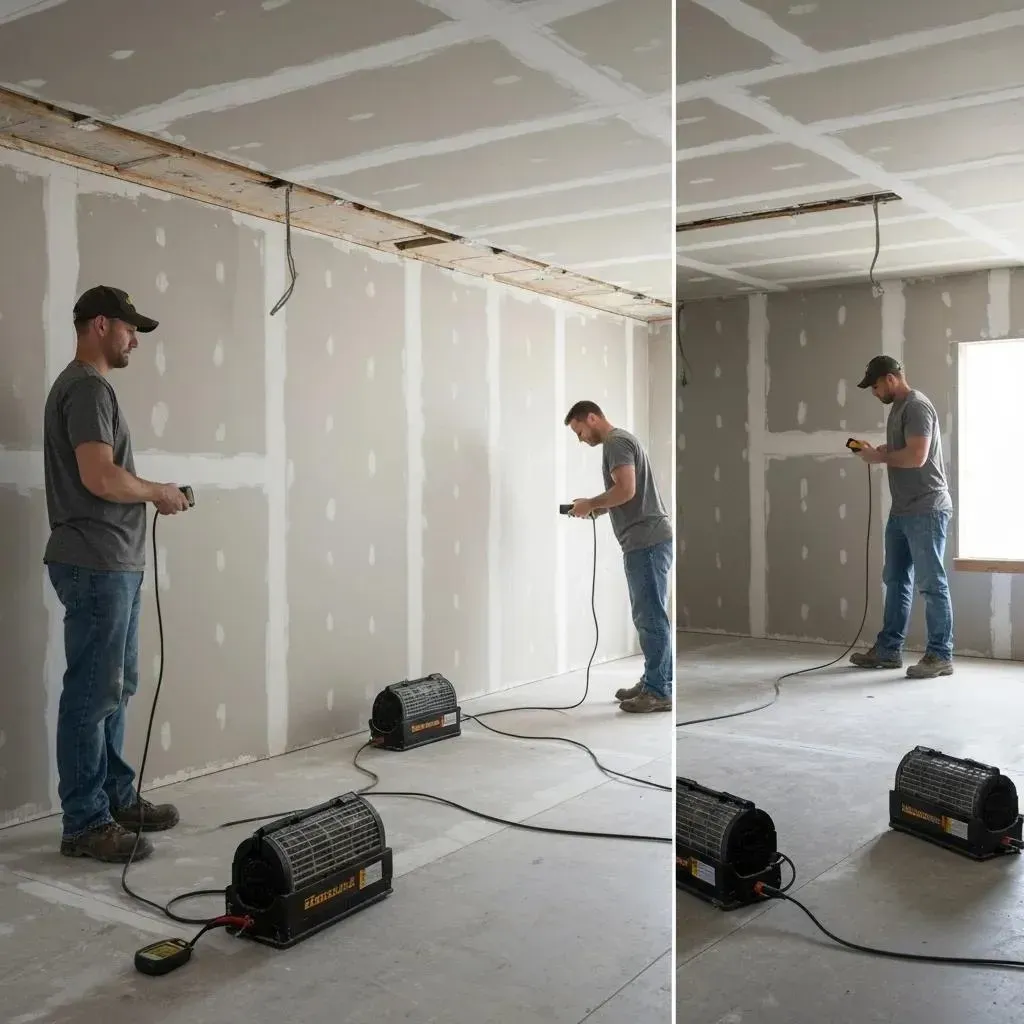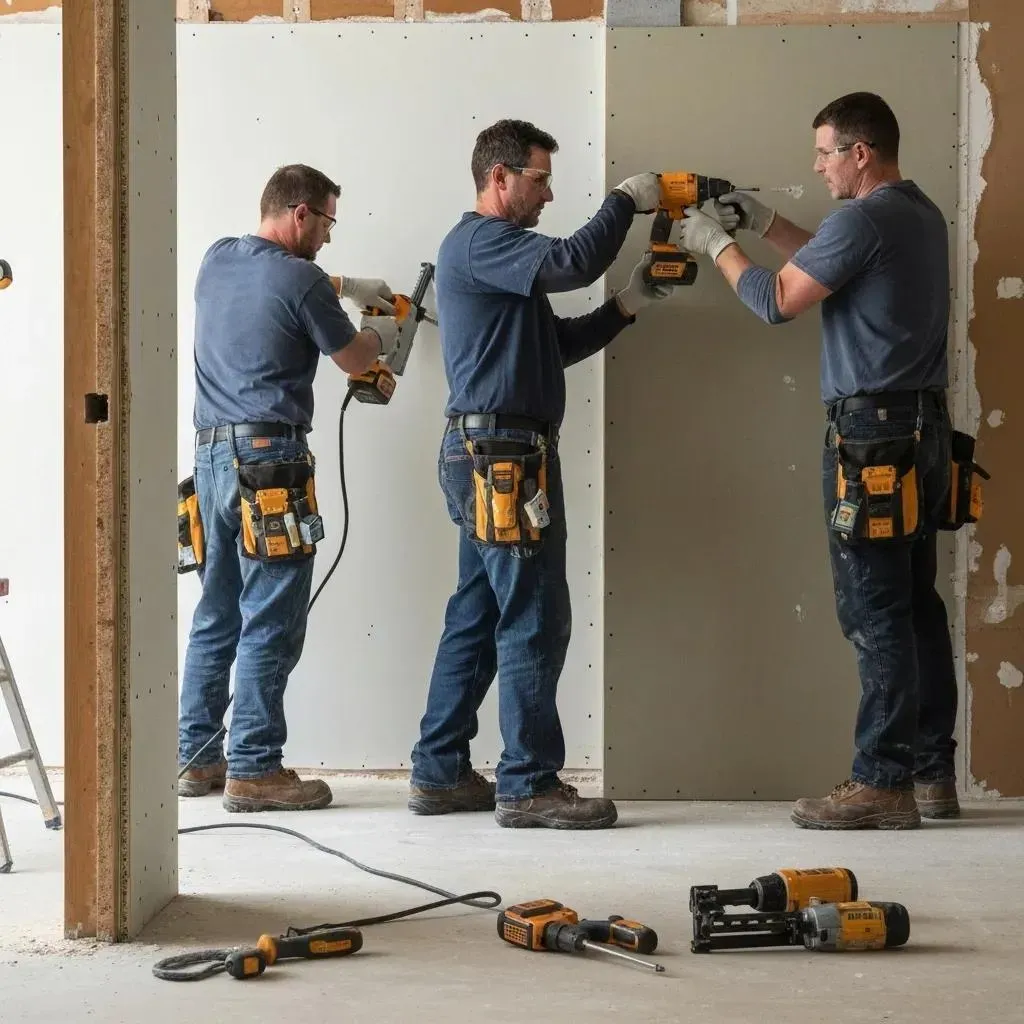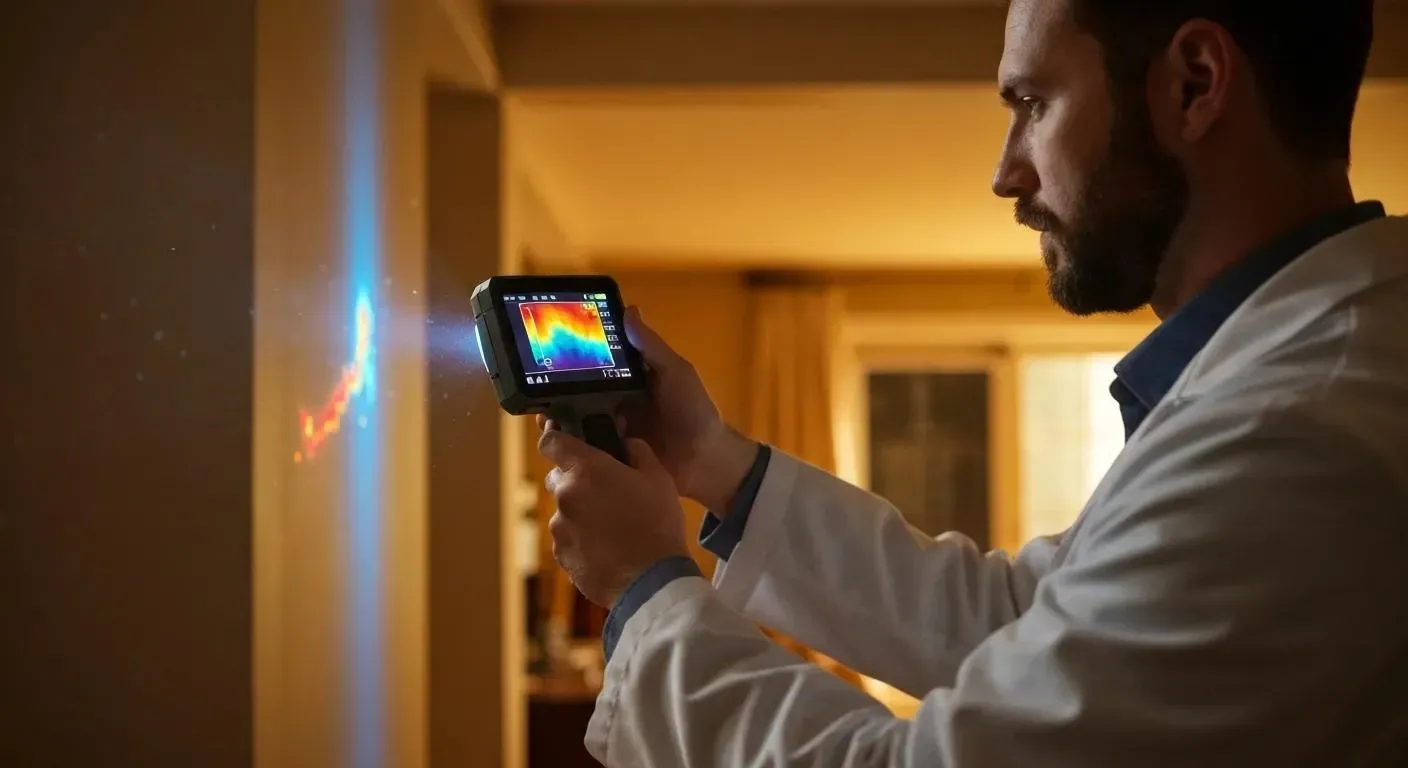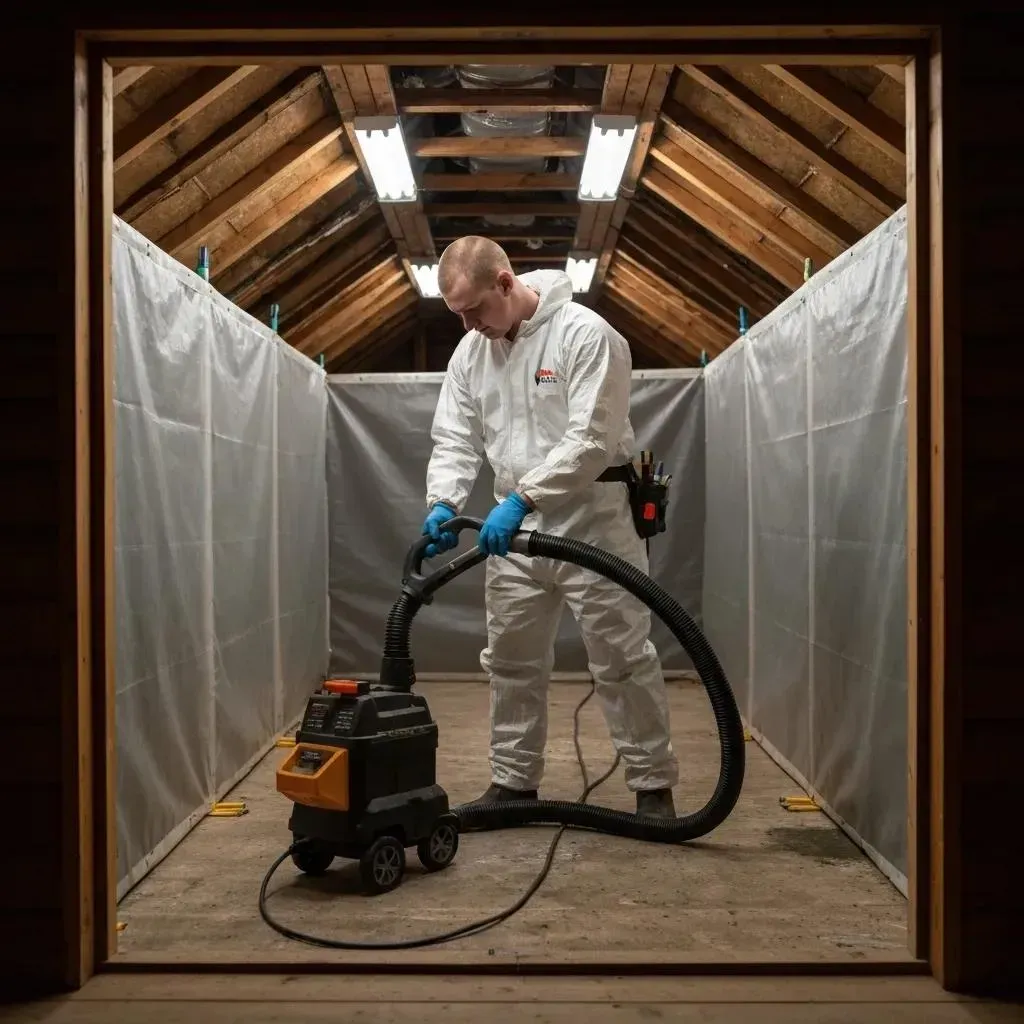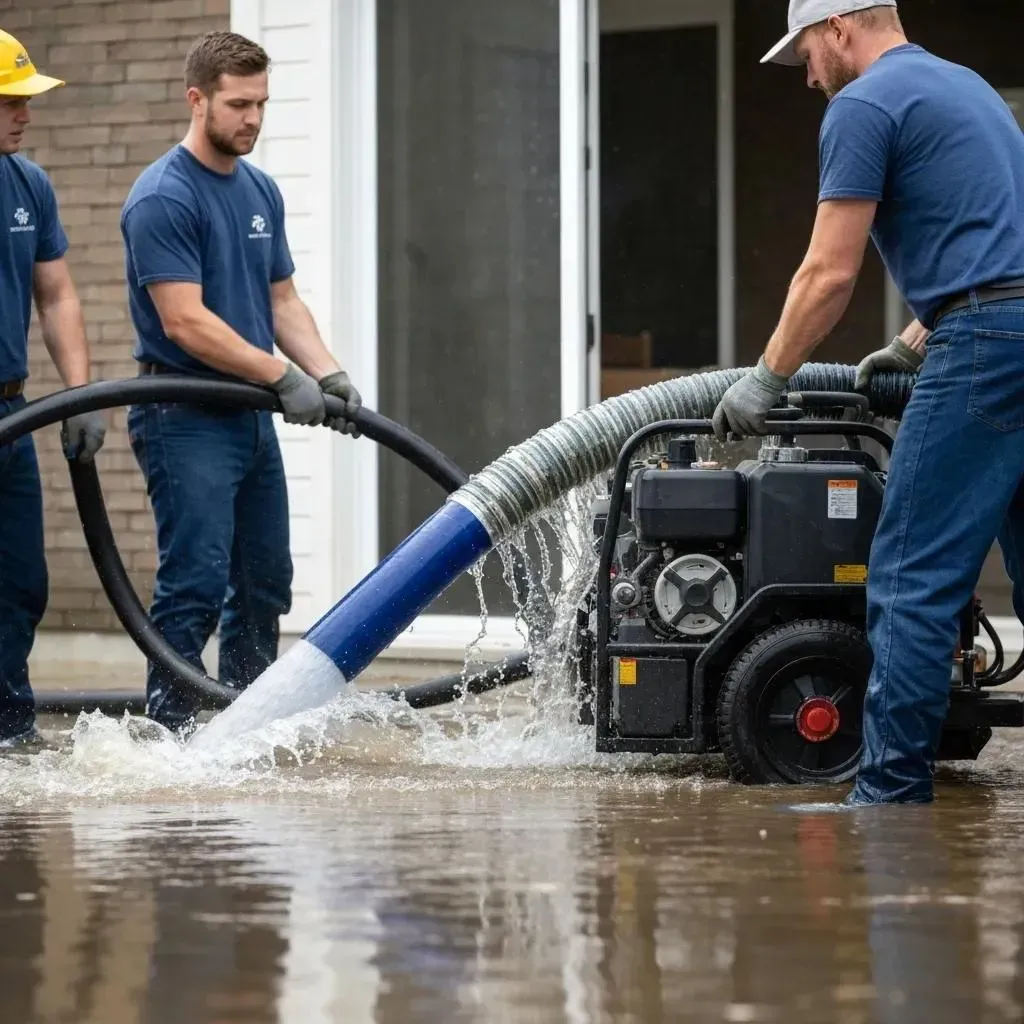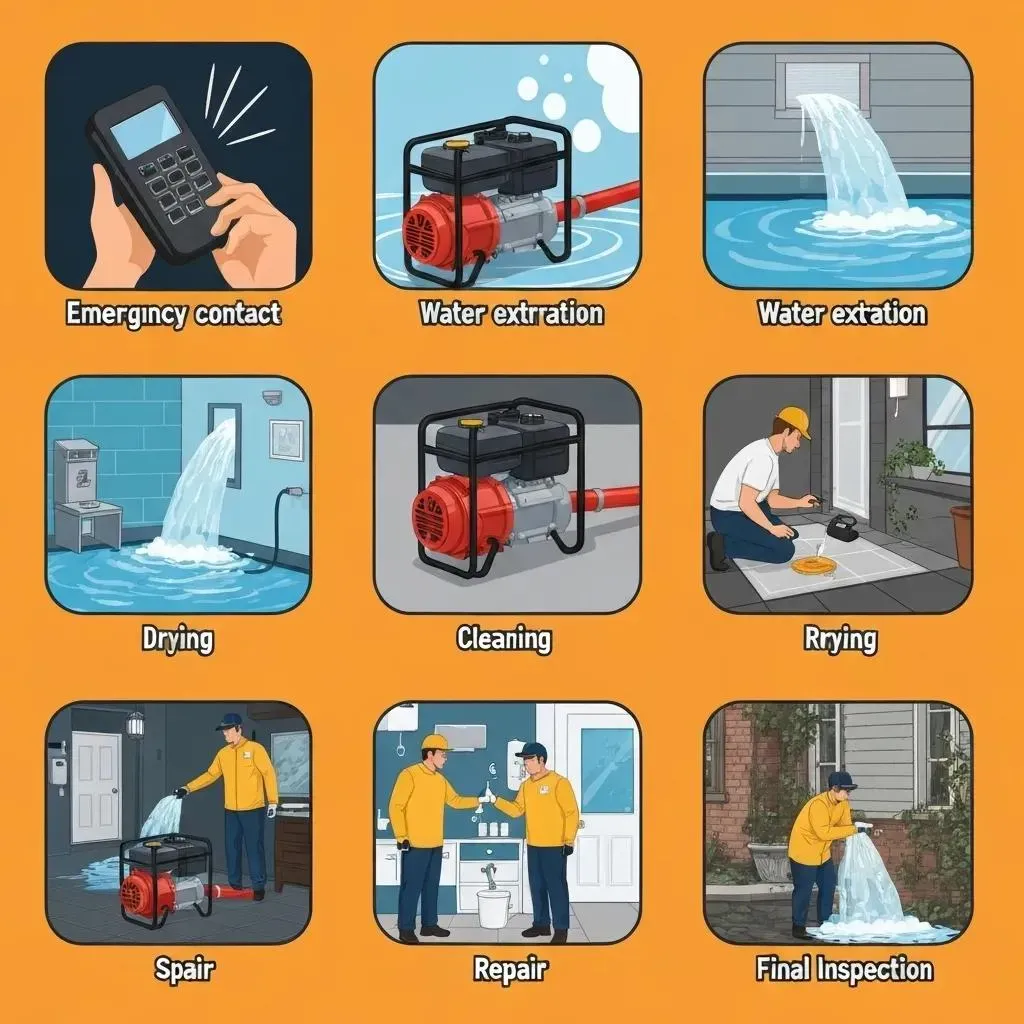Blog
When Water Strikes: Why Professional Emergency Water Removal Services Save Your Home
Emergency water removal services are specialized 24/7 restoration companies that extract standing water, dry structures, and prevent mold growth after floods, pipe bursts, or appliance failures. Here's what you need to know:
Key Services Provided:
- Immediate water extraction(within 60-90 minutes)
- Structural drying with industrial dehumidifiers
- Moisture detection using thermal cameras
- Mold prevention treatments
- Direct insurance billing assistance
Critical Timeline:
- 0-24 hours: Water spreads rapidly, metals tarnish
- 48 hours: Mold begins growing
- 1 week+: Restoration costs increase dramatically
Water doesn't wait for convenient timing. Whether it's a burst pipe flooding your finished basement at 2 AM or a dishwasher leak soaking your hardwood floors, every minute counts in preventing permanent damage to your Denver home.
The research shows that mold and mildew can begin growing within just 48 hours of water exposure. Delays beyond one week can lead to stained carpets, buckled flooring, and repair costs that skyrocket from hundreds to thousands of dollars.
I'm Mike Martinez, owner of Accountable Home Services, and I've helped hundreds of Denver-area families recover from water emergencies over the past decade. My team specializes in Emergency water removal services that combine rapid response with transparent communication, ensuring your family gets back to normal as quickly as possible.
Why Speed Matters in a Water Emergency
Water is incredibly invasive —it spreads through your property in minutes, soaking into everything it touches. From the instant a pipe bursts or an appliance fails, you're in a race against time because water damage gets worse by the hour. We've watched restoration costs triple when homeowners wait just one week to call for help.
Think of water damage like a snowball rolling downhill: during the first 60 minutes you're dealing with surface moisture; by 24 hours metals tarnish and electrical risks appear; at 48 hours mold spores activate; after one week reconstruction may be your only option.
The First 60 Minutes
I've seen a small dishwasher leak turn a beautiful kitchen into a soggy mess in 30 minutes. In this hour:
- Carpet padding behaves like a sponge, trapping water that’s hard to remove later.
- Hardwood floors begin to swell and cup.
- Furniture finishes can bleed onto carpets, creating permanent stains.
- Drywall wicks moisture upward where you can’t see it.
1–24 Hours After the Leak
Without professional extraction the same day:
- Metal surfaces rust and hinges seize.
- Low-level electrical outlets become safety hazards.
- Organic materials develop that tell-tale musty odor.
Even if carpets look dry on top, backing can separate and ruin the entire piece.
48 Hours–1 Week
This is the danger zone. Mold and bacteria thrive after 48–72 hours, turning property damage into a health threat. Drywall softens, wood framing warps, and insulation loses its R-value, driving up future energy bills.
Beyond One Week
Past seven days you’re moving from restoration to reconstruction. Structural integrity may be compromised and mold remediation becomes its own costly project. Insurance adjusters scrutinize delays, and total expenses rise three- to five-fold compared to calling Emergency water removal services immediately.
The bottom line? Every hour you wait, both the damage—and the bill—get bigger.
How to Choose Emergency Water Removal Services You Can Trust
When water is flooding your home, you don't have time to research every company in Denver. You need Emergency water removal services that you can trust to show up fast and do the job right. But here's the thing - not all water removal companies are the same.
I've seen too many homeowners get burned by companies that promise the world but show up with inadequate equipment or disappear when insurance complications arise. The key is knowing what to look for before disaster strikes.
The gold standard in our industry is IICRC certification- that's the Institute of Inspection, Cleaning and Restoration Certification. Think of it as the difference between a certified mechanic and someone who just likes working on cars. You want technicians who've been properly trained and tested.
Beyond certification, you need a company with genuine 24/7 dispatch- not just an answering service that takes messages. When your basement is flooding at 3 AM, you need to talk to someone who can actually send help. Look for companies with a local Denver presence too. A company based three states away might promise fast response, but physics still applies.
Direct insurance billing is another game-changer. The last thing you need while dealing with water damage is fighting with insurance paperwork. The best companies handle this coordination for you, so you only pay your deductible upfront.
Emergency Water Removal Services for Rapid Response (Within 60 Minutes)
Speed means nothing without the right equipment. I've watched homeowners try to handle water removal with shop vacuums and box fans from the hardware store. It's like trying to empty a swimming pool with a coffee cup.
Professional Emergency water removal services bring industrial-grade equipment that makes all the difference. Truck-mounted extractors have ten times more suction power than anything you can rent. High-velocity air movers and commercial dehumidifiers work together to pull moisture out of the air and materials faster than Denver's dry climate alone ever could.
What really sets professionals apart is thermal imaging cameras. Water doesn't always stay where you can see it. It travels through wall cavities, under flooring, and into areas that look completely dry. These cameras reveal hidden moisture pockets that would otherwise become mold problems weeks later.
At Accountable Home Services, our trucks stay loaded with extraction equipment 24/7. We guarantee arrival within 90 minutes anywhere in the Denver Metro Area because we know every minute counts. Our Emergency Flood Damage Repair: Fast Solutions for Urgent Situations page explains exactly how our rapid response system works.
Emergency Water Removal Services with Insurance Billing Support
Here's what nobody tells you about water damage - the insurance process can be almost as stressful as the flood itself. Claims adjusters want detailed documentation. They need photos, moisture readings, and estimates that match their specific requirements. Miss one step, and your claim gets delayed or denied.
The best Emergency water removal services handle all of this coordination as part of their service. They take detailed photos of every affected area before starting work. They communicate directly with your insurance adjuster and provide the exact documentation needed for smooth claim processing.
We work with every major insurance provider in Colorado and have established relationships with local adjusters. This means faster approvals and less hassle for you. Most of our clients only pay their deductible upfront - we handle the rest through direct billing. Our Water Damage Restoration Services: Act Fast page details exactly how we streamline this process.
Specialized Emergency Water Removal Services for Sewage & Category 3 Water
Not all water emergencies are created equal. Clean water from a burst pipe is completely different from sewage backup or flood water contaminated with chemicals and bacteria. We call heavily contaminated water "Category 3" water, and it requires specialized handling that goes way beyond normal water removal.
Personal protective equipment isn't optional with contaminated water - it's a safety requirement. Technicians need full PPE including respirators, gloves, and protective suits. Biohazard containment prevents contamination from spreading to clean areas of your home.
The cleaning process involves EPA-registered antimicrobial treatments that kill bacteria, viruses, and parasites that can cause serious illness. Contaminated materials often can't be cleaned - they need specialized disposal. Air scrubbing equipment removes airborne contaminants that regular fans would just spread around.
Comparing Credentials & Guarantees
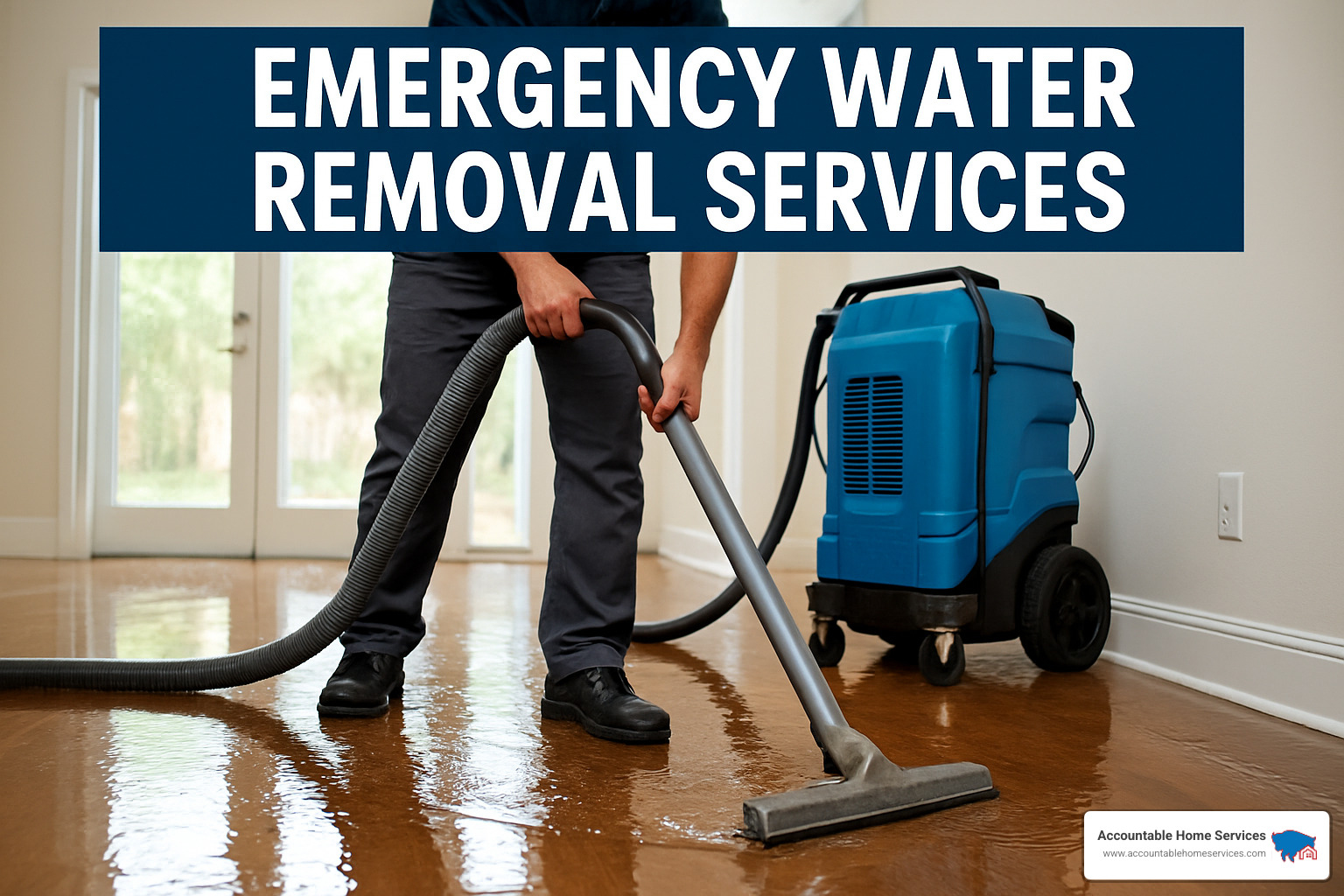
When you're comparing Emergency water removal services, credentials tell the real story. IICRC certification isn't just a nice-to-have - it's proof that technicians have been properly trained in water restoration techniques. Look specifically for WRT (Water Restoration Technician) certification.
State licensing is legally required for contractors in Colorado, but you'd be surprised how many companies operate without proper licenses. Always ask for their license number and verify it's current. Insurance and bonding protects you if something goes wrong during the restoration process. We carry minimum $1 million general liability coverage.
Here's where many companies fall short - response guarantees. Lots of companies claim fast response, but few put it in writing. A written guarantee shows they're serious about emergency service. Satisfaction warranties are equally important. If a company won't back up their work with a money-back guarantee, that tells you something about their confidence in their results.
| Credential | Why It Matters | What to Look For |
|---|---|---|
| IICRC Certification | Industry standard for restoration | WRT (Water Restoration Technician) certification |
| State Licensing | Legal requirement for contractors | Current license number you can verify |
| Insurance & Bonding | Protects you from liability | Minimum $1M general liability |
| Response Guarantee | Shows commitment to urgency | Written guarantee of response time |
| Satisfaction Warranty | Backs up their work | Money-back guarantee on services |
At Accountable Home Services, all our technicians hold current IICRC certifications. We're fully licensed, bonded, and insured in Colorado. We guarantee 90-minute response times in writing and back all our work with a satisfaction warranty. When your home is flooding, you need a company that stands behind their promises with more than just words.
Inside the Professional Water Removal Process
When you call professional Emergency water removal services, you're getting much more than someone with a shop vacuum and some fans. There's actually a precise, scientific approach that separates real restoration professionals from well-meaning amateurs who might make things worse.
Step 1: Site Assessment & Moisture Mapping
The first thing our certified technicians do might surprise you - we don't immediately start sucking up water. Instead, we become detectives, using infrared thermal cameras to see what your eyes can't. These aren't the cheap thermal guns you can buy online; we're talking about professional-grade equipment that reveals moisture hiding behind walls, under floors, and in places you'd never think to check.
We also use hygrometers to measure humidity levels and moisture meters to determine exactly how much water different building materials have absorbed. Those penetrating probes can check moisture levels deep inside thick materials like hardwood subfloors or concrete slabs.
Here's why this matters: I've seen homeowners think they dried everything out, only to have mold bloom a week later because water was trapped in places they couldn't see. We provide a free wet check and moisture inspection because finding all the water upfront prevents nasty surprises later.
Our Water Extraction and Removal service always starts with this comprehensive moisture mapping. It's like having X-ray vision for water damage.
Step 2: High-Capacity Extraction
Now comes the dramatic part - actually removing the water. But even here, there's more strategy than you might expect. We use submersible pumps for deep standing water, but the real workhorses are our truck-mounted extractors with vacuum systems that generate incredible suction power.
Those weighted extraction wands aren't just for show - they're specifically designed to pull water from carpet padding and other hard-to-reach areas. We also have specialty tools for delicate surfaces like hardwood floors that need gentler handling.
The difference between our truck-mounted units and a rental shop vacuum is like comparing a fire hose to a garden sprinkler. Our equipment generates about ten times more suction, which means we can remove water that would otherwise be impossible to extract.
Step 3: Structural Drying & Dehumidification
Here's where the real science kicks in. Removing standing water is actually the easy part - the challenge is getting moisture out of building materials before mold can take hold. This is where most DIY attempts fail completely.
We use low-grain refrigerant dehumidifiers that can pull moisture from the air more effectively than anything you can rent. For specialty situations, we bring in desiccant dehumidification systems that work differently but achieve even better results in certain conditions.
Our heat drying systems warm materials above the dew point, which accelerates evaporation in ways that regular fans simply can't match. We also create controlled airflow patterns that optimize how moisture moves through your home.
Step 4: Cleaning, Disinfection & Odour Control
Water damage almost always brings unwanted guests - bacteria, potential mold spores, and odors that can make your home unpleasant to live in. We don't just ignore these problems and hope they go away.
Our HEPA air scrubbers actually remove airborne contaminants from your home's air. We use EPA-registered antimicrobials to kill bacteria and mold spores before they can establish colonies. Those specialized deodorizers don't just mask smells - they eliminate odors at their source.
Step 5: Restoration & Build-Back
The final step is getting your home back to the way it was before the water damage - or sometimes even better. This might involve drywall replacement in areas where materials absorbed too much water to be safely saved. We handle flooring reinstallation with proper moisture barriers to prevent future problems.
Our team also takes care of paint and finish work to match your existing surfaces. You shouldn't be able to tell where the damage occurred once we're finished. We conclude with a final inspection to ensure everything meets our standards and yours.
Our 24/7 Emergency Property Restoration service means you work with one company from the initial emergency call through the final walk-through. No juggling multiple contractors or wondering if everyone is communicating properly.
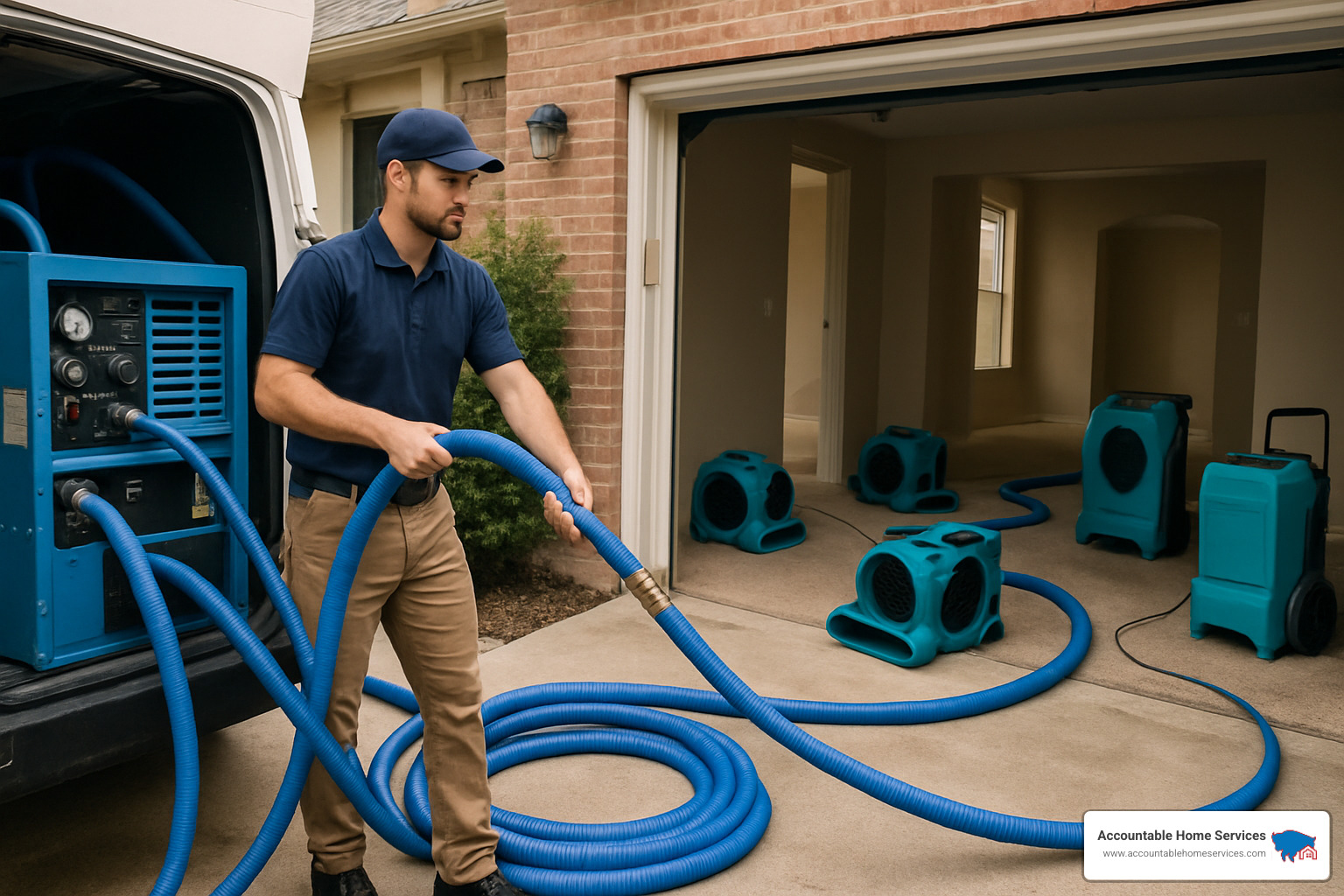
Cost, Insurance & Prevention Insights
Let's talk money - because understanding the financial side of water damage helps you make smart decisions about Emergency water removal services and protecting your investment.
When water hits your home, you're dealing with two financial realities: the immediate cost of professional restoration and the long-term savings from preventing bigger problems. The good news? Most water damage situations are covered by homeowner's insurance when you act quickly and work with certified professionals.
Scientific research on climate resilience and flood risk shows that proactive homeowners who invest in prevention and rapid response save thousands compared to those who delay or attempt DIY solutions.
What Insurance Typically Covers
Here's what makes insurance companies happy: sudden and accidental water damage. The key word is "sudden" - insurance distinguishes between acute emergencies (which they'll cover) and gradual problems you should have noticed and fixed.
Burst pipes are usually covered, especially when they're caused by freezing temperatures or normal wear and tear. Appliance failures also get the green light from most insurers. When your dishwasher decides to flood the kitchen or your water heater gives up the ghost, that's considered an unexpected mechanical failure.
Storm damage that allows rain to enter through damaged roofs or windows is covered under most policies. Colorado's hailstorms can create roof damage that leads to interior flooding, and insurance companies understand this isn't something homeowners can prevent.
Red-Flags That Can Void Coverage
Here's where things get tricky. Insurance companies will deny claims faster than you can say "water damage" if they suspect neglected maintenance or gradual damage.
Ignored small leaks are coverage killers. That drip under the kitchen sink you've been meaning to fix? If it causes major damage, insurance may argue you should have addressed it sooner. Flood damage from external sources requires separate flood insurance. Your standard homeowner's policy won't cover water that enters from outside during storms or spring snowmelt.
Sewer backup is another common exclusion unless you've purchased specific endorsement coverage. Gradual damage from long-term leaks or frozen pipes in unheated areas like crawl spaces often get denied.
Proactive Moves to Avoid the Next Flood
Prevention beats restoration every time - for your wallet, your stress levels, and your family's comfort. After responding to hundreds of water emergencies, I can tell you that most could have been prevented with simple maintenance.
Clean gutters twice yearly- spring and fall. Colorado's cottonwood trees and autumn leaves create perfect conditions for ice dams and overflow. Grade soil away from foundation walls so water flows away from your home rather than pooling against basement walls.
Install backflow preventers on basement drains, especially in older Denver neighborhoods where municipal systems can back up during heavy rains. A $200 device can prevent a $10,000 sewage cleanup.
Test sump pumps before each storm season by pouring water into the pit. Replace the battery in battery backup systems annually. Replace appliance hoses every five years- especially washing machine hoses and ice maker lines. Rubber deteriorates over time, and a $15 hose replacement beats a $3,000 water damage claim.
Install smart leak detectors near water heaters, under sinks, and behind washing machines. These $50 devices can alert you to problems before they become disasters.
The bottom line? Every dollar spent on prevention saves you ten dollars in restoration costs. Plus, you avoid the stress and disruption that comes with water damage emergencies.
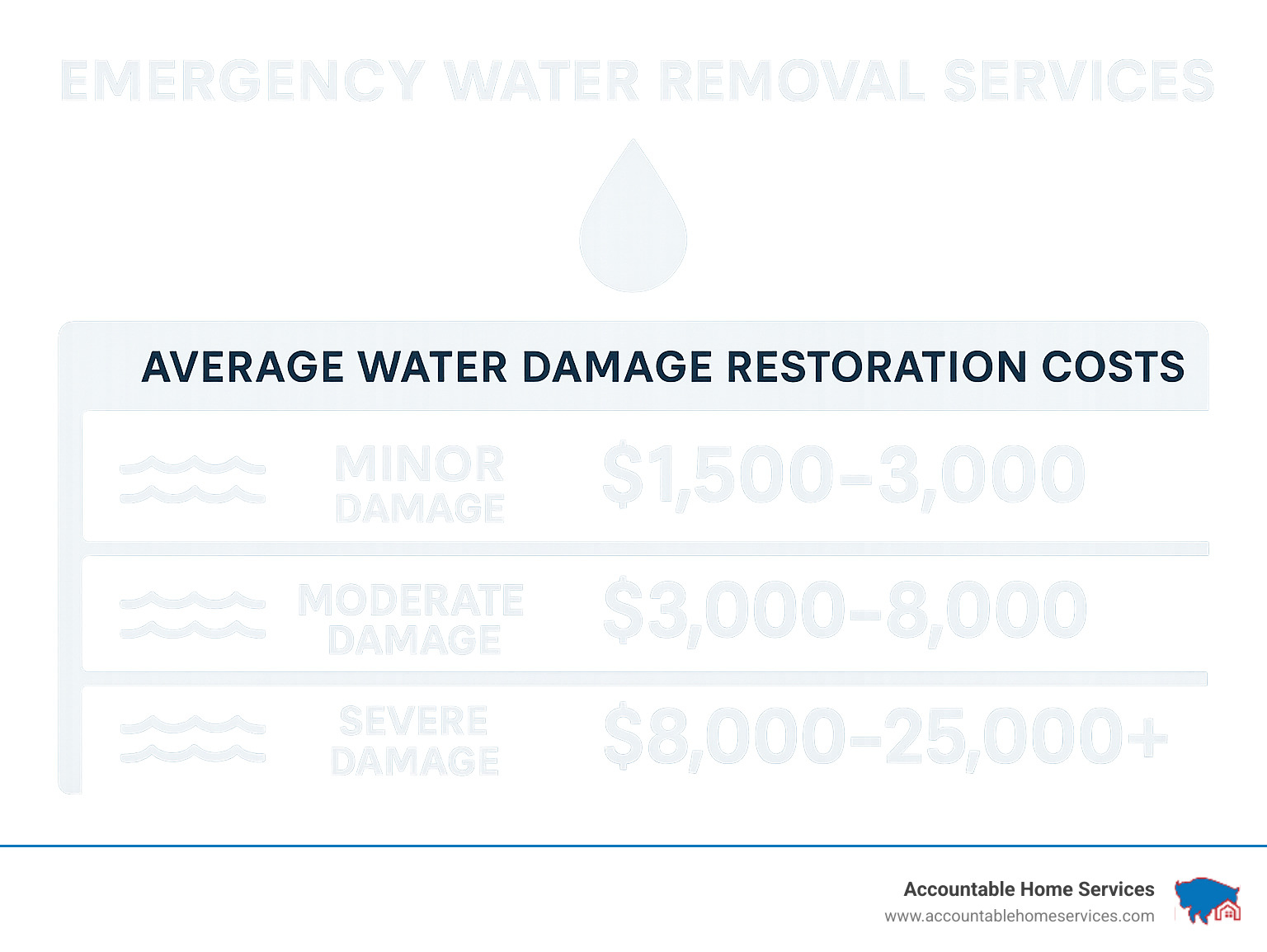
Frequently Asked Questions About Emergency Water Removal Services
How quickly should extraction begin after a leak or flood?
Here's the honest truth: every minute matters when water enters your home. Professional Emergency water removal services should begin extraction within the first 60 minutes whenever possible - and there's solid science behind this urgency.
Water doesn't just sit politely in one spot. It spreads throughout your property like it's on a mission, saturating everything in its path within minutes. The damage timeline is pretty unforgiving. In the first 4 hours, you're looking at minimal structural damage and relatively easier cleanup. But between 4-24 hours, water really starts absorbing into your building materials.
Here's where it gets scary: 24-48 hours is when mold spores begin activating. And after 48 hours? You're dealing with significant mold growth and structural damage that could have been completely avoided.
That's exactly why we guarantee 90-minute response times throughout the Denver Metro Area. We've learned that the difference between a quick response and a delayed one can literally save thousands of dollars in damage.
What equipment do professionals use that DIY can't match?
I get this question a lot, usually from homeowners standing ankle-deep in water, holding a shop vacuum and wondering if they should call for help. The equipment difference between professional Emergency water removal services and DIY attempts is honestly dramatic.
Our truck-mounted extractors generate about 10 times more suction power than the strongest shop vacuum you can rent. While you're emptying a 5-gallon tank every few minutes, our units are pulling thousands of gallons directly into our truck-mounted systems.
But it's not just about power. We use thermal imaging cameras that detect moisture hiding behind walls and under floors - water you can't see but that will cause problems later. Your eyes can't compete with infrared technology that shows exactly where moisture is lurking.
Our commercial dehumidifiers remove about 5 times more moisture from the air than home units. And those air movers we set up? They're positioned using scientific airflow patterns to maximize evaporation, not just pointed randomly like household fans.
How long does the full drying process usually take?
Most homeowners expect everything to be dry overnight, but complete structural drying typically takes 3-7 days. I know that sounds like a long time when you want your life back to normal, but rushing this process is where people get into real trouble.
The timeline depends on several factors that we evaluate during our initial assessment. The extent of water damage obviously matters - a small bathroom leak dries faster than a flooded basement. Types of materials make a huge difference too. Concrete and thick hardwood take much longer than drywall or carpet.
Environmental conditions play a big role. Colorado's dry climate actually helps us, but if it's humid or cold, drying takes longer. We monitor moisture levels daily using our scientific instruments and provide you with updates on drying progress. The process isn't complete until all materials return to normal moisture content levels.
Conclusion
When water strikes your Denver home, you're not just dealing with a mess - you're facing a race against time that could determine whether you're looking at a manageable cleanup or a major reconstruction project. The difference between a quick recovery and months of disruption often comes down to one crucial decision: choosing the right Emergency water removal services.
You need more than someone with a wet vacuum and good intentions. You need a partner who understands that behind every flooded basement in Broomfield or burst pipe in Westminster is a family dealing with stress, uncertainty, and the fear that their home might never feel the same again.
That's where professional Emergency water removal services make all the difference. It's not just about the truck-mounted extractors or thermal imaging cameras - though those matter tremendously. It's about having someone answer your panicked 2 AM phone call with calm expertise, someone who can look at your water-damaged kitchen and say "We've got this" with the confidence that comes from helping hundreds of Denver families through similar crises.
At Accountable Home Services, we've built our reputation on being that reliable partner when everything feels overwhelming. Our IICRC-certified technicians don't just extract water - they guide you through the entire process, from that first emergency call through the final walkthrough when your home is restored to its pre-damage condition. We handle the direct insurance billing so you're not juggling paperwork while your home is drying out, and we provide the kind of transparent communication that helps you sleep at night knowing exactly what's happening and when.
Whether you're dealing with a sump pump failure in Thornton, an appliance leak in Lakewood, or storm damage in Arvada, our 24/7 emergency response means you're never facing water damage alone. We understand that your home isn't just a building - it's where your family gathers for dinner, where your kids take their first steps, where your most precious memories live.
Don't let water damage steal those memories or turn a manageable emergency into a months-long nightmare. When seconds count and every decision matters, you need Denver's most trusted Emergency Water Extraction Services on your side.
Remember: in water emergencies, every minute counts. The faster you act, the more of your home we can save - and the sooner your family can get back to making new memories in the place you love most.

